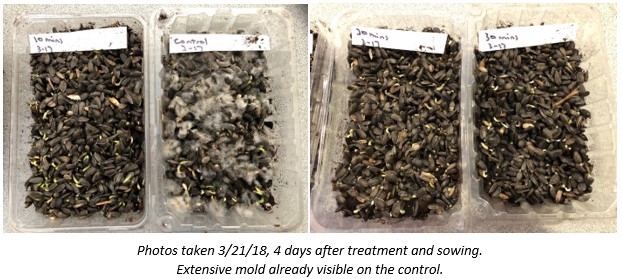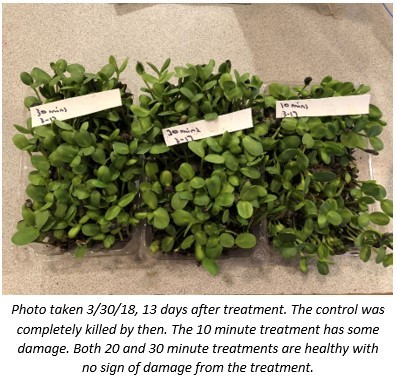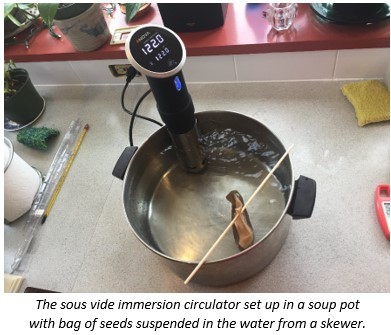Moldy Sunflower Shoots
Amy Ivy, Vegetable Specialist
Eastern New York Commercial Horticulture
A few of our growers have struggled in late winter with gray mold growing over their flats of sunflower shoots. The mold is botrytis, growing on the outside of the hulls, and it can really ruin a flat of shoots.
I have been interested in hot water seed treatments for spinach, brassicas and tomatoes and I wondered if that process might be helpful for this problem on sunflowers. Meg McGrath has detailed information on hot water seed treating at http://vegetablemdonline.ppath.cornell.edu/NewsArticles/HotWaterSeedTreatment.html Note: This process is recommended only for small seeded crops and Meg has specific temperatures and times for treating each type. But I decided to experiment a bit on my own to see if I could at least lessen the severity of botrytis on sunflower shoot production.
I had 4 treatments: 10 minutes, 20 minutes, 30 minutes (all at 122 degrees) and the 4th was the control without any water treatment. I thought the 30 minute treatment might affect germination but as you can see from the pictures, for this crop it did not. After 2 weeks all 3 water treatments were germinating well with no visible mold while the control was heavily infested.


This is not a replicated, formal research study, just a casual test that had some interesting results, so I cannot guarantee this method. But growers who have had problems with moldy sunflower sprouts might want to give this a try so see if they get similar results.
Also interesting is the device I used for the hot water treatment. Available for around $110 online, this ‘immersion circulator' was developed for cooking meat using the sous vide method popularized by Kenji Lopez-Alt, chef/author of The Food Lab and the blog Serious Eats. See: https://www.seriouseats.com/2016/01/first-thing-to-cook-with-sous-vide-immersion-circulator-essential-recipes.html for more information.

This ‘immersion circulator' device can be used throughout the year for all kinds of home cooking; and can then be put into service for hot water treating particular seeds. Ideally you will need 2 units, one to pre-heat the seeds to 100 degrees and the second to precisely treat the seeds at the particular temperature listed in Meg McGrath's publication. I particularly like the way these units keep the water moving, for more even temperatures and distribution.

Upcoming Events
2026 Northeast Extension Fruit Consortium Winter Webinar Series
February 4, 2026 : Management of Up and Coming Strawberry Diseases in the Northeastern United States
Session 1: Management of Up and Coming Strawberry Diseases in the Northeastern United States
February 11, 2026 : Kiwiberry Production in the Northeast
Session 2: Kiwiberry Production in the Northeast
February 18, 2026 : Heat Mitigation- Sunburn and Fruit Coloring
Session 3: Heat Mitigation- Sunburn and Fruit Coloring
February 25, 2026 : The Dating Game- Updates in Lepidopteran Mating Disruption
Session 4: The Dating Game- Updates in Lepidopteran Mating Disruption
March 4, 2026 : USEPA Endangered Species Act Strategies and Pesticide Use
Session 5: USEPA Endangered Species Act Strategies and Pesticide Use
March 11, 2026 : Practical Drought Management for Fruit Growers
Session 6: Practical Drought Management for Fruit Growers
Managing the Invasive Swede Midge Webinar
March 6, 2026 : Managing the Invasive Swede Midge Webinar
Swede midge is an invasive fly that causes serious economic losses to brassica crops. Due to its small size and hidden feeding habits, swede midge is often called an "invisible pest" and damage may be misdiagnosed. In this webinar, we will review the swede midge life cycle and crop damage symptoms, current management recommendations, new research findings, and highlights from on-farm case studies with a focus on organic management.
New Farm Manager Skills Day - Get the Tools You Need to Grow Your People (Hudson Valley)
March 10, 2026 : New Farm Manager Skills Day - Get the Tools You Need to Grow Your People
Millbrook, NY
Are you moving into a supervisory farm management role this season and want to get off to a good start? Are you an experienced manager who wants to connect with other "people" managers and work on your skills? This one-day workshop is for you!












































